Mineral Soaks
I take pride in crafting each of my mineral bath soaks by hand, infusing them with a thoughtful selection of natural ingredients renowned for their therapeutic properties. With a passion for promoting wellness, I meticulously combine various minerals, botanicals, and essential oils to create a range of luxurious and beneficial bath products. Whether it’s soothing Epsom salts for muscle relief, mineral-rich Dead Sea salt for skin rejuvenation, or the calming effects of lavender and chamomile for relaxation, I take great care to tailor each blend to address a spectrum of ailments and needs. Every batch is a labor of love, ensuring that my customers receive the utmost in both quality and therapeutic benefits, transforming their bath time into a rejuvenating and healing experience.
Benifits of Mineral Soaks
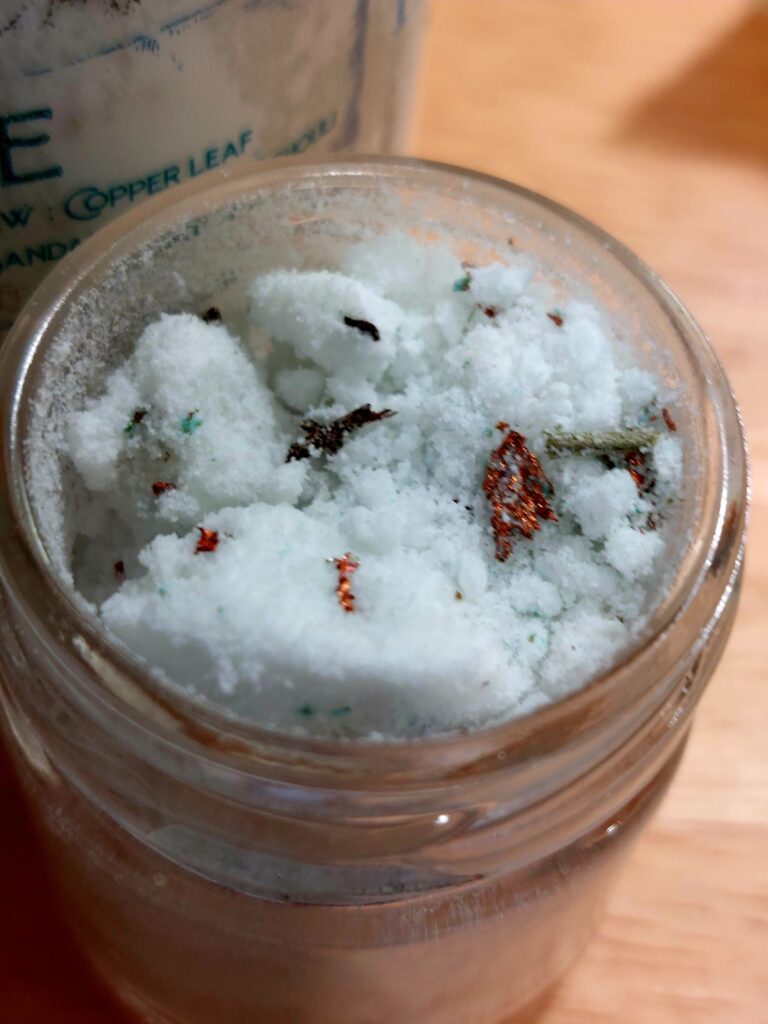
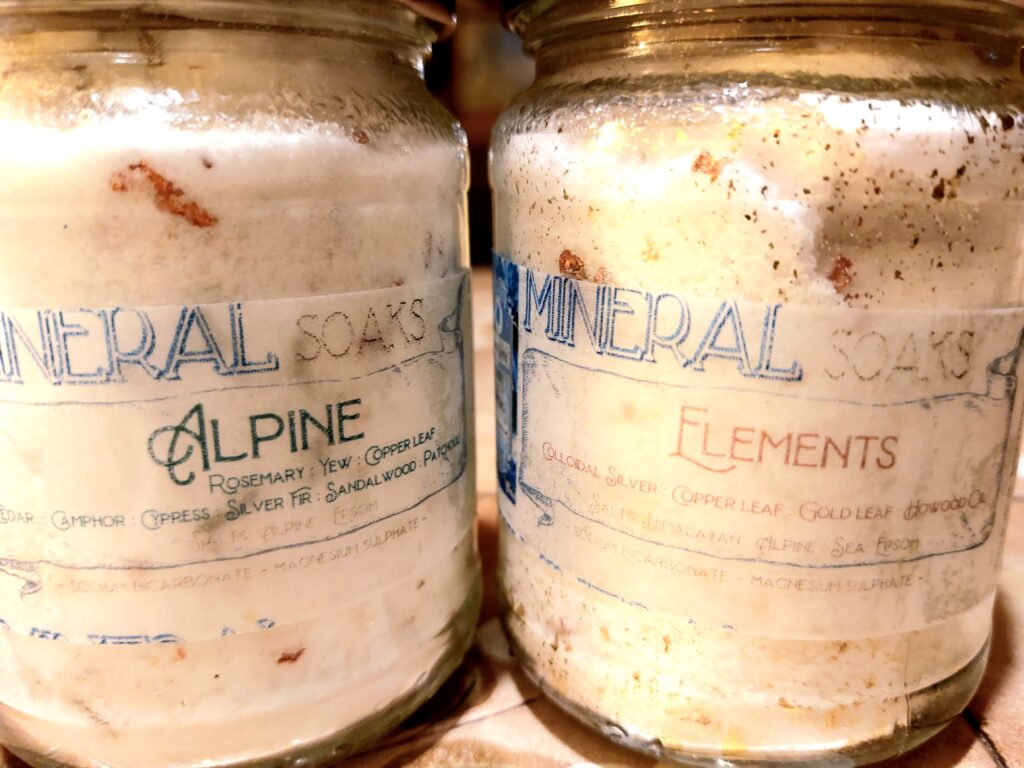
Epsom salt baths, also known as magnesium sulfate baths, are a popular home remedy with several potential benefits. Epsom salt is a compound made up of magnesium and sulfate, and when dissolved in warm water and used for soaking, it can offer the following advantages:
Relaxation and Stress Reduction: Soaking in an Epsom salt bath can help relax your body and mind. The warmth of the water combined with the magnesium can reduce stress and promote a sense of calm.
Pain Relief: Epsom salt baths may help alleviate muscle and joint pain. The magnesium in the salt can be absorbed through the skin and assist in reducing inflammation and relieving sore muscles, making it a popular choice for athletes or individuals with muscle aches.
Improved Sleep: Epsom salt baths can promote better sleep by relaxing your muscles and reducing stress. A warm bath before bedtime can be a soothing part of a bedtime routine that helps you fall asleep more easily.
Detoxification: While the idea of detoxifying the body through Epsom salt baths is not scientifically proven, some people believe that the sulfates in Epsom salt may assist the body in removing toxins. However, the human body has its own natural detoxification processes, and the extent to which Epsom salt baths aid in this is not well-established.
Skin Health: Epsom salt baths may help with skin conditions such as eczema and psoriasis by soothing and softening the skin. The salt can also help exfoliate dead skin cells, leaving your skin feeling refreshed and rejuvenated.
Constipation Relief: Some people use Epsom salt as an oral laxative to relieve constipation, but this should be done under the guidance of a healthcare professional. It should not be ingested without proper medical advice.
It’s important to note that while many people find Epsom salt baths to be beneficial, individual responses can vary. If you have any underlying medical conditions or concerns, it’s a good idea to consult with a healthcare provider before using Epsom salt baths, especially if you plan to use them for a specific health purpose. Additionally, be sure to follow the recommended guidelines for Epsom salt concentration and bath duration to avoid any potential side effects or skin irritation.
Adding salt to bath water can offer several benefits for relaxation and skincare. Epsom salt, for instance, is known for its muscle-soothing properties, making it an excellent choice for relieving tension and aches. Bath salts, in general, can help improve skin hydration by drawing moisture into the skin and promoting a healthy balance of electrolytes. The minerals in bath salts, such as magnesium and potassium, can have a calming effect, reducing stress and promoting a sense of well-being. Additionally, the exfoliating properties of bath salts can help slough off dead skin cells, leaving the skin feeling softer and smoother. Overall, a salt-infused bath can be a delightful way to unwind, rejuvenate the skin, and ease the body and mind.
Himalayan Salt
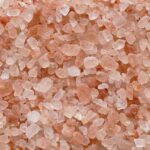
Himalayan salt, often referred to as pink salt due to its distinctive color, offers several potential benefits:
Rich in Minerals: Himalayan salt is prized for its high mineral content, including potassium, magnesium, and calcium. These minerals can be beneficial for maintaining a healthy electrolyte balance in the body.
Improved Hydration: The minerals in Himalayan salt can help attract and retain moisture in the skin, which may promote improved skin hydration and leave it feeling soft and smooth.
Respiratory Health: Some people use Himalayan salt lamps or salt inhalers to potentially alleviate respiratory issues. The salt may help reduce allergens, pollutants, and irritants in the air, which could provide relief for individuals with respiratory conditions like asthma or allergies.
Detoxification: Bathing in water infused with Himalayan salt is believed to promote detoxification by helping the body eliminate toxins and impurities through the skin.
Culinary Use: Himalayan salt is a popular alternative to table salt, as it contains fewer additives and impurities. It can enhance the flavor of dishes and may provide a slight nutritional advantage due to its mineral content.
Improved Sleep and Relaxation: Some people use Himalayan salt in salt lamps to create a soothing ambiance and potentially improve sleep quality by emitting a warm, gentle light that can help create a tranquil atmosphere.
Alpine Salt
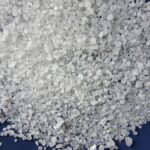
Alpine salt, also known as rock salt, is harvested from salt mines in mountainous regions like the Alps. While it shares some similarities with Himalayan salt, it has its own unique characteristics and potential benefits:
Mineral Content: Alpine salt is rich in essential minerals, including sodium, potassium, magnesium, and calcium. These minerals play important roles in maintaining proper electrolyte balance in the body.
Flavor Enhancement: Alpine salt can be used in cooking to enhance the flavor of dishes. Its mineral-rich composition can add depth and complexity to various recipes, making it a preferred choice for many chefs.
Natural and Unprocessed: Alpine salt is typically less processed than table salt, which often contains additives like anti-caking agents and iodine. Choosing less-processed salts like alpine salt can provide a more natural and wholesome alternative.
Potential for Skin Health: Some people use alpine salt in skincare routines, as it can help exfoliate the skin, remove dead skin cells, and promote a smoother, healthier complexion when used in scrubs or bath salts.
Digestive Health: In moderation, consuming alpine salt may support proper digestion by aiding in the release of digestive enzymes and saliva, which are crucial for breaking down food.
Relaxation and Aromatherapy: Alpine salt can be used in salt lamps or in bath salts to create a soothing and calming environment for relaxation and potential stress relief.
Dead Sea Salt
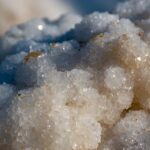
Dead Sea salt is well-known for its numerous potential benefits, particularly for skincare and wellness:
Skin Health: Dead Sea salt is rich in minerals like magnesium, calcium, and potassium, which can help improve skin hydration, promote elasticity, and support overall skin health. It is often used in exfoliating scrubs and masks to remove dead skin cells and rejuvenate the skin.
Eczema and Psoriasis Relief: Dead Sea salt baths or topical applications are known to alleviate the symptoms of skin conditions like eczema and psoriasis. The minerals in the salt can help reduce itching, redness, and inflammation, providing relief for those with these skin issues.
Muscle Relaxation: The high magnesium content in Dead Sea salt can help relax muscles, reduce muscle cramps, and relieve soreness. Soaking in a bath with Dead Sea salt is often used by athletes and individuals with muscle pain.
Joint Pain: Some people find relief from joint pain and arthritis symptoms by using Dead Sea salt baths, as the minerals in the salt may have anti-inflammatory properties that can help reduce discomfort.
Circulation and Blood Pressure: Soaking in Dead Sea salt baths may help improve blood circulation and, in some cases, contribute to regulating blood pressure due to the high magnesium content.
Stress Reduction: The calming and relaxing properties of Dead Sea salt baths can help reduce stress and promote a sense of well-being. The minerals in the salt may have a soothing effect on the nervous system.
Detoxification: Dead Sea salt is believed to assist in the removal of impurities and toxins from the skin, supporting the body’s natural detoxification processes.
Colloidal Silver

Bathing in water with colloidal silver is a practice that some people believe offers potential health benefits, although the scientific evidence supporting these claims is limited and controversial. It’s important to exercise caution and consult with a healthcare professional before using colloidal silver in any form, including in baths. Here are some of the perceived benefits associated with bathing in water containing colloidal silver:
Antibacterial and Antifungal Properties: Colloidal silver is thought to have antibacterial and antifungal properties, and some individuals use it to address skin conditions like acne, eczema, or fungal infections. It may help inhibit the growth of certain microorganisms on the skin.
Skin Health: Supporters of colloidal silver suggest that bathing in it can promote healthier skin by reducing inflammation and addressing skin issues. It is sometimes used in an attempt to soothe irritated or damaged skin.
Immune Support: Some proponents believe that colloidal silver can help boost the immune system when absorbed through the skin. It is thought to support the body’s ability to fight off infections.
Wound Care: Colloidal silver has been used in wound care products to potentially reduce the risk of infection and support the healing process. Bathing in colloidal silver may be seen as a way to maintain overall skin health.
Gold
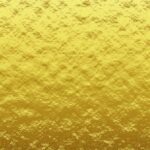
Using gold leaf in bath water is a luxury practice that has been associated with various perceived benefits, although it is primarily used for aesthetic and relaxation purposes. Some of the potential benefits and reasons people use gold leaf in their bath water include:
Aesthetic Luxury: The shimmering, reflective quality of gold leaf can create a visually stunning and opulent bathing experience. It is often used in high-end spa treatments to provide a sense of indulgence and extravagance.
Relaxation and Stress Reduction: The sheer novelty and aesthetic appeal of gold leaf in bath water can help create a sense of relaxation and luxury, potentially reducing stress and promoting a feeling of well-being during the bath.
Skin Hydration: Some individuals believe that gold leaf can have a moisturizing effect on the skin, leaving it feeling soft and smooth. However, scientific evidence to support this claim is limited.
Potential Healing Properties: In traditional medicine and alternative therapies, gold has been associated with potential healing properties. Some people believe that the use of gold leaf in bath water can support overall health and vitality, although scientific evidence for these claims is lacking.
Aromatherapy and Essential Oils: Gold leaf may be used in combination with aromatherapy and essential oils, creating a sensory experience that enhances relaxation and contributes to a luxurious bathing ritual.
Silver
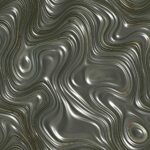
Using silver leaf in bath water is another luxury practice that can provide a visually stunning and opulent bathing experience. While the primary reasons for incorporating silver leaf in bath water are aesthetic and relaxation-based, some potential benefits and reasons people use silver leaf in their bath water include:
Aesthetic Luxury: Silver leaf, like gold leaf, creates a visually striking and opulent appearance in the bathwater. The shimmering silver color adds a touch of extravagance and indulgence to the bathing experience.
Relaxation and Stress Reduction: The luxurious and visually appealing nature of silver leaf in bath water can help promote relaxation and reduce stress by creating a unique and soothing atmosphere during the bath.
Skin Hydration: Some individuals believe that silver leaf may have a moisturizing effect on the skin, potentially leaving it feeling soft and smooth. However, scientific evidence to support this claim is limited.
Aromatherapy and Essential Oils: Silver leaf may be used in combination with aromatherapy and essential oils, enhancing the sensory experience and contributing to a luxurious bathing ritual.
Tradition and Symbolism: In some cultures and traditions, silver is associated with purity and protection. Using silver leaf in bath water may have symbolic or cultural significance for some individuals.
Copper
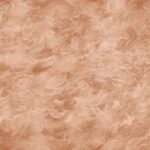
Using copper in bathwater, specifically in the form of copper ions or copper-infused products, is a practice with potential benefits, especially for skin health and overall wellness. Here are some of the potential advantages of using copper in bathwater:
Antimicrobial Properties: Copper has natural antimicrobial properties, which can help eliminate or reduce the growth of harmful microorganisms such as bacteria and fungi. This can contribute to cleaner and more hygienic bathwater, potentially reducing the risk of skin infections.
Skin Health: Copper is known to support collagen and elastin production, essential proteins for maintaining skin’s elasticity and youthfulness. Bathing in copper-infused water may help improve skin’s texture, hydration, and overall appearance.
Anti-Inflammatory Effects: Copper has anti-inflammatory properties that may soothe irritated or inflamed skin. This can be beneficial for individuals with conditions like eczema or psoriasis.
Joint Health: Some people believe that copper-infused bathwater can potentially alleviate joint pain and inflammation. Copper is thought to support connective tissue and joint health, although the scientific evidence for this is limited.
Wellness and Balance: In some alternative medicine practices, copper is associated with balancing energy in the body, helping to promote overall health and well-being. Bathing in copper-infused water can be seen as a way to achieve this balance.
Improved Water Quality: Copper ions in bathwater can help to clarify the water and remove impurities, providing a clean and refreshing bathing experience.
Essential Oils

Using essential oils in bath water can provide a variety of benefits for relaxation, skincare, and overall well-being. Here are some of the advantages of incorporating essential oils into your bath:
Aromatherapy: Essential oils can create a pleasant and soothing aroma, promoting relaxation and reducing stress and anxiety. Different oils have distinct scents, allowing you to choose one that aligns with your mood and desired effect, such as lavender for relaxation or eucalyptus for invigoration.
Skin Nourishment: Certain essential oils, like lavender, chamomile, or rose, have skin-nourishing properties. When diluted in bathwater, they can help moisturize the skin, reduce dryness, and soothe skin irritations.
Pain Relief: Essential oils like peppermint, ginger, or eucalyptus may have analgesic properties that can help relieve muscle aches and pains. They can provide a sense of relief and relaxation during the bath.
Respiratory Benefits: Inhaling steam infused with essential oils, such as eucalyptus or tea tree, can be helpful for clearing nasal congestion and improving respiratory health.
Improved Sleep: A warm bath with relaxing essential oils, such as lavender or chamomile, can help induce a sense of calm and may promote better sleep quality.
Mood Enhancement: Certain essential oils, like citrus oils (e.g., lemon, orange, or bergamot), are known for their mood-enhancing properties. Adding them to your bath can help uplift your spirits and enhance your mood.
Stress Reduction: Essential oils like lavender, bergamot, or ylang-ylang are often used in aromatherapy for their stress-reducing effects. Incorporating them into your bath can create a calming environment and reduce tension.
Improved Blood Circulation: Essential oils like ginger or rosemary may help improve blood circulation, potentially benefiting your cardiovascular health and promoting a sense of vitality.
Himalayan Black salt
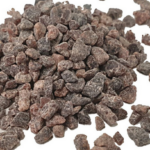
Himalayan black salt, when used in bath preparations, offers several benefits for relaxation and skincare. Its high mineral content, including potassium, magnesium, and calcium, can help soothe sore muscles and promote relaxation. The salt’s natural exfoliating properties can remove dead skin cells, leaving the skin feeling smoother and softer. Additionally, the sulfur compounds in black salt are believed to have potential detoxifying effects, aiding in the removal of impurities from the skin. A Himalayan black salt bath can be a rejuvenating and cleansing experience, providing a holistic approach to self-care. It does have a slight sulphur smell.
Quartz
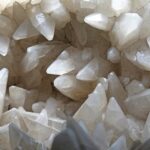
Quartz is believed by some to have certain potential benefits when used in bathing, although these claims are not scientifically supported and are often based on holistic or alternative healing practices. Here are some of the perceived benefits of using quartz in bathing:
Energetic Cleansing: In some alternative healing traditions, quartz crystals are thought to have purifying and cleansing properties that can help remove negative energies and promote emotional and spiritual well-being.
Enhanced Relaxation: Some individuals believe that bathing with quartz crystals can create a calming and soothing atmosphere, promoting relaxation and reducing stress.
Improved Skin Health: While the primary benefit of quartz is often associated with its energetic properties, proponents suggest that it can also contribute to healthier, more radiant skin, although scientific evidence for this is limited.
Balancing Energies: Quartz is thought to help balance and align the body’s energies, potentially improving overall well-being and vitality.
Spiritual Connection: In various belief systems, quartz crystals are associated with enhancing spiritual connections, and bathing with quartz may be seen as a way to promote a deeper connection with one’s inner self or a higher power.
Chalk

Chalk, which is primarily composed of calcium carbonate, can offer several potential benefits when added to bathwater. Here are a few:
Skin Softening: Chalk can help soften the skin by increasing the water’s alkalinity. This can be especially beneficial for individuals with dry or rough skin.
Soothing Properties: The alkaline nature of chalk may help soothe skin conditions like eczema or psoriasis, providing relief from itching and irritation.
Relaxation: A chalk-infused bath can create a relaxing and calming atmosphere, allowing you to unwind and de-stress.
Detoxification: Some believe that chalk baths may aid in detoxification by drawing out impurities and toxins from the skin.
Muscle Relief: The alkaline properties of chalk can also potentially help ease muscle soreness and tension.
It’s essential to use chalk in moderation, as excessive use may lead to water hardness and potentially clog drains. As with any bath additives, individuals with sensitive skin should perform a patch test to ensure they do not have adverse reactions.
Benefits of Crystals & Gems

The use of crystals and gems in bathwater is a practice rooted in holistic and alternative healing traditions, and their benefits are largely anecdotal and based on individual beliefs. Here are some crystals and gems that people often use in bathwater for their perceived benefits:
Rose Quartz: Often associated with love and self-care, rose quartz is believed to promote feelings of love, compassion, and relaxation. Some people use it in bathwater to enhance self-love and emotional well-being.
Amethyst: Amethyst is considered a calming and spiritual crystal. Bathing with amethyst is thought to promote relaxation, balance emotions, and improve mental clarity.
Clear Quartz: Clear quartz is believed to amplify the energy of other crystals. It’s used in bathwater to enhance the benefits of other crystals or to promote clarity and balance.
Citrine: Citrine is associated with positivity, abundance, and confidence. Bathing with citrine may help boost self-esteem and encourage a more positive outlook.
Selenite: Selenite is often used to cleanse and purify energy. When placed in bathwater, it’s thought to help remove negative energies and promote clarity and relaxation.
Black Tourmaline: Known for its protective qualities, black tourmaline is believed to shield against negative energies and stress. Bathing with this crystal may help you feel more grounded and secure.
Lepidolite: Lepidolite is associated with emotional balance and tranquility. Bathing with lepidolite is thought to reduce anxiety and promote relaxation.
Moonstone: Moonstone is often connected to intuition and emotional healing. Bathing with moonstone may enhance your emotional awareness and promote inner peace.
Essential Oils

Using essential oils in bath water can provide a variety of benefits for relaxation, skincare, and overall well-being. Here are some of the advantages of incorporating essential oils into your bath:
Aromatherapy: Essential oils can create a pleasant and soothing aroma, promoting relaxation and reducing stress and anxiety. Different oils have distinct scents, allowing you to choose one that aligns with your mood and desired effect, such as lavender for relaxation or eucalyptus for invigoration.
Skin Nourishment: Certain essential oils, like lavender, chamomile, or rose, have skin-nourishing properties. When diluted in bathwater, they can help moisturize the skin, reduce dryness, and soothe skin irritations.
Pain Relief: Essential oils like peppermint, ginger, or eucalyptus may have analgesic properties that can help relieve muscle aches and pains. They can provide a sense of relief and relaxation during the bath.
Respiratory Benefits: Inhaling steam infused with essential oils, such as eucalyptus or tea tree, can be helpful for clearing nasal congestion and improving respiratory health.
Improved Sleep: A warm bath with relaxing essential oils, such as lavender or chamomile, can help induce a sense of calm and may promote better sleep quality.
Mood Enhancement: Certain essential oils, like citrus oils (e.g., lemon, orange, or bergamot), are known for their mood-enhancing properties. Adding them to your bath can help uplift your spirits and enhance your mood.
Stress Reduction: Essential oils like lavender, bergamot, or ylang-ylang are often used in aromatherapy for their stress-reducing effects. Incorporating them into your bath can create a calming environment and reduce tension.
Improved Blood Circulation: Essential oils like ginger or rosemary may help improve blood circulation, potentially benefiting your cardiovascular health and promoting a sense of vitality.
